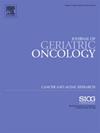现实世界的卵巢癌护理及其对老年人生存的影响:来自澳大利亚国家妇科肿瘤登记处(NGOR)的一项观察性研究
IF 3
3区 医学
Q3 GERIATRICS & GERONTOLOGY
引用次数: 0
摘要
与最佳实践指南相比,年龄≥70岁的卵巢癌(OC)女性可能会经历不同的护理,与70岁的女性相比,她们的5年生存率明显较低。国家妇科肿瘤登记处(NGOR)是澳大利亚第一个妇科癌症临床质量登记处(CQR),使用15个OC临床质量指标(cqi)来衡量护理模式,反映了循证实践。本研究旨在比较新诊断为OC的老年组和年轻组对cqi的依从性,并评估5年总生存率(OS)的差异。材料和方法这是一项多中心观察性研究,利用NGOR数据在参与研究的地点(2017年5月至2022年7月)对新诊断为OC的女性进行研究。比较年龄≥70岁(老年组)和70岁(年轻组)妇女的人口统计学、cqi和临床变量。预计OS为5年。结果共有1628名妇女入选。≥70岁组中位OS为3.37年(95% CI: 3.05-3.86年),而70岁组中位OS未达到(95% CQI: 5.95 - n/a年)。与年轻组相比,老年妇女接受一线铂-紫杉烷双重化疗的频率较低(69.1% vs 91.6%, p <;0.001)和一线化疗铂-紫杉烷双药联合贝伐单抗(18.9% vs 29.9%, p = 0.02)。老年妇女在无肉眼残留的情况下进行初级手术的可能性较低(46.4%对60.8%,p = 0.03),临床试验参与率较低(15.5%对21.7%,p = 0.005)。在调整了ECOG表现状态、组织学亚型、癌症分期和治疗组后,老年妇女的5年OS仍然显著降低,调整后的死亡风险比为1.50 (95% CI: 1.27-1.76, p = 0.001)。老年女性卵巢癌患者的护理存在显著差异,特别是在完成完全的原发性手术细胞减少、标准化疗方案的使用和试验招募方面。经调整后,老年妇女的生存率仍明显低于年轻妇女。这些发现强调了澳大利亚老年OC妇女护理质量潜在改善的具体领域。本文章由计算机程序翻译,如有差异,请以英文原文为准。
Real-world ovarian cancer care and its survival impact on older adults: An observational study from the Australian National Gynae-Oncology Registry (NGOR)
Introduction
Women aged ≥70 years with ovarian cancer (OC) may experience variations in care compared to best practice guidelines, and their five-year survival is significantly lower compared to women aged <70 years. The National Gynae-Oncology Registry (NGOR) is Australia's first clinical quality registry (CQR) for gynaecological cancers, measuring patterns of care using 15 OC clinical quality indicators (CQIs) reflecting evidence-based practice. This study aimed to compare adherence to CQIs for older versus younger groups with newly diagnosed OC and evaluate differences in 5-year overall survival (OS).
Materials and Methods
This is a multi-centre, observational study utilizing NGOR data for women with newly diagnosed OC at participating sites (May 2017 to July 2022). Demographics, CQIs, and clinical variables were compared between women aged ≥70 years (older group) and those aged <70 years (younger group). Five-year OS was estimated.
Results
A total of 1628 women were eligible. Median OS was 3.37 years (95 % CI: 3.05–3.86 years) in the ≥70 group versus not reached in the younger group aged <70 (95 % CQI: 5.95 – n/a years). Compared to the younger group, older women less frequently received first-line platinum-taxane doublet chemotherapy (69.1 % vs 91.6 %, p < 0.001) and first-line chemotherapy with a platinum-taxane doublet plus bevacizumab (18.9 % vs 29.9 %, p = 0.02). Older women were less likely to achieve primary surgery with no macroscopic residue (46.4 % vs 60.8 %, p = 0.03) and had lower clinical trial enrolment (15.5 % vs 21.7 %, p = 0.005). After adjusting for ECOG Performance Status, histological sub-type, cancer stage, and treatment group, five-year OS remained significantly lower in the older women with an adjusted HR for death 1.50 (95 % CI: 1.27–1.76, p = 0.001).
Discussion
Significant differences in care were observed in older women with OC, notably in achieving complete primary surgical cytoreduction, utilization of standard chemotherapy regimens, and trial enrolment. Survival for older women remains significantly lower than for younger women after adjustment. These findings highlight specific areas for potential quality improvement in the care of older Australian women with OC.
求助全文
通过发布文献求助,成功后即可免费获取论文全文。
去求助
来源期刊

Journal of geriatric oncology
ONCOLOGY-GERIATRICS & GERONTOLOGY
CiteScore
5.30
自引率
10.00%
发文量
379
审稿时长
80 days
期刊介绍:
The Journal of Geriatric Oncology is an international, multidisciplinary journal which is focused on advancing research in the treatment and survivorship issues of older adults with cancer, as well as literature relevant to education and policy development in geriatric oncology.
The journal welcomes the submission of manuscripts in the following categories:
• Original research articles
• Review articles
• Clinical trials
• Education and training articles
• Short communications
• Perspectives
• Meeting reports
• Letters to the Editor.
 求助内容:
求助内容: 应助结果提醒方式:
应助结果提醒方式:


